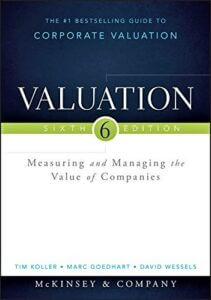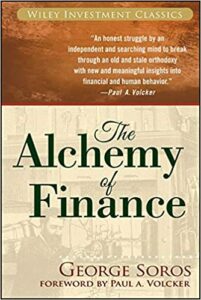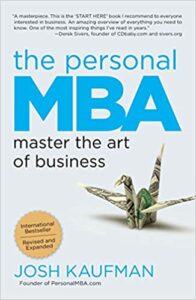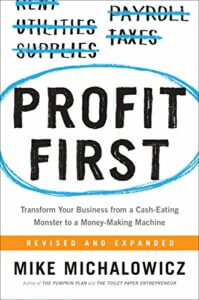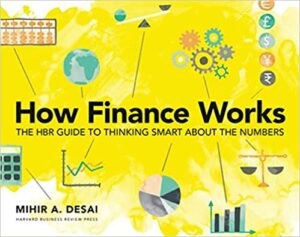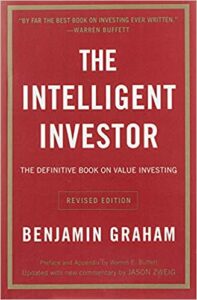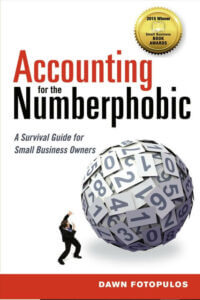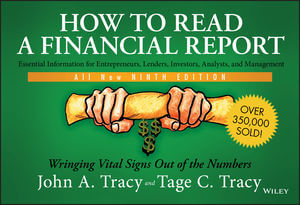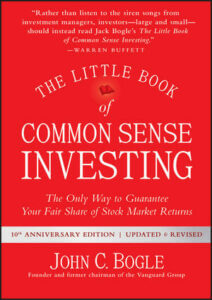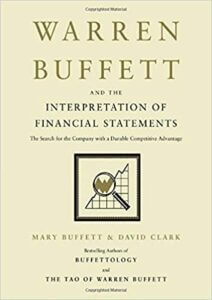Updated July 6, 2023
Best Books to Learn Business Finance
Business finance books provide strategies for finding funding and making money. These books intend to provide capital for projects, boost earnings, and aid in the long-term financial performance of organizations.
The list of business finance books aids readers at all levels of expertise in their understanding of Business Finance. Beginners can use this as a starting point, and professionals with more expertise can use it as a reference guide. These deal with funding, debt management, profit, return on investment, trade, and valuation.
Here are the top 10 business finance books to learn the necessary skills and advance your career (these books are not sequenced as per rating).
Let us discuss each business finance book in detail, outlining their reviews and key points.
Book #1: Valuation: Measuring and Managing the Value of Companies
Author: McKinsey & Company Inc., Tim Koller, Marc Goedhart, and David Wessels
Buy this book here.
Review:
The book explains how to appropriately assess a company while considering variables like taxes, inflation, running and non-operating expenditures, and retirement. It thoroughly explains how to determine a company’s value and get the best returns on investment. It also describes situations and exceptions, like emerging markets and fast-growing businesses.
Key Points:
- How to create value, predict and assess performance, and strategic investment & management
- Comprehensive, in-depth advice on key components of corporate valuation
- A description of the valuation complexities, tactics, and procedures
- Information on both fundamental and cutting-edge management practices.
Book #2: The Alchemy of Finance
Author: George Soros
Buy this book here.
Review:
The Alchemy of Finance is the written wisdom of renowned investor George Soros. The book offers a framework for financial decision-making and explains Soros’s trading and investment methods. While later chapters predict future trends, earlier chapters examine economics via a historical lens. Although the book’s economic experiment occurred in the 1980s, the lessons learned, and market insights still apply today.
Key Points:
- The book discusses economics and reflexivity, the human uncertainty principle, and power relationships.
- The multi-billionaire investor offers a new perspective on economic behavior by outlining how the actions of financial actors impact market activity.
- It contains unique investment techniques, including the “theory of reflexivity,” which forms their basis.
Book #3: The Personal MBA: Master the Art of Business
Author: Josh Kaufman
Buy this book here.
Review:
This book is one of the best books on business finance for beginners. The main point made by the author is that becoming a business expert can be achieved without going to business school. It discusses a variety of MBA programs and has a sizable section on finance that provides a thorough overview of the best ways to make money. It also explains market analysis.
Before launching a new business, one should conduct research, especially if one intends to invest all of their assets. The book serves as a crash course in company operations and is a guide to making businesses profitable and effective.
Key Points:
- It explains the Iron Law of the Market, which discusses why firms work according to the size and caliber of the market it services
- The book also teaches complementary subjects such as valuation, sales, and improving systems.
- It also states how and why adding value for your clients is necessary through the 12 Standard Forms of Value.
- It explains cash flow, income statements, purchasing power, lifetime value, pricing, and funding.
Book #4: Profit First: Transform Your Business from a Cash-Eating Monster to a Money-Making Machine
Author: Mike Michalowicz
Buy this book here.
Review:
Profit First states that profit serves as the foundation for making money. Leaders should start by imagining the target profit and move backward from there. This strategy pushes businesses to act deliberately and make decisions that advance the ultimate objective. It also guides how to avoid potential obstacles and implement ideas. Tools like a setup guide and a preliminary assessment on the final pages make the advice more actionable.
Key Points:
- It lays out the realistic actions business owners can take to improve their bank balances.
- These summaries suggest a new strategy that ensures ongoing profitability
- It guides how to expand businesses and start making money by creating a routine for handling finances.
Book #5: How Finance Works: The HBR Guide to Thinking Smart About the Numbers
Author: Mihir Desai
Buy this book here.
Review:
According to Desai, to achieve professionally, a person must make sensible financial decisions and develop the confidence to defend those decisions to others. The book serves as a primer for the field of financial systems. The manual examines how wise leaders make financial decisions and touches on capital allocation. It simplifies complex ideas into brief explanations for beginners’ easy understanding. However, experienced experts can benefit from it.
Key Points:
- The book covers essential concepts such as valuation, financial analysis, capital markets, etc.
- The book demystifies finance while guiding readers through its intricate but inexhaustibly fascinating realm.
- It covers concepts that teach the skills to comprehend finance functions through exciting case studies, interactive exercises, full-color images, etc.
Book #6: The Intelligent Investor
Author: Benjamin Graham
Buy this book here.
Review:
Examining a company’s financial records and operational performance is essential for investors, but they should ignore market volatility. This book compels readers to make long-term investments rather than pursue quick gains. It also describes how the stock market works and offers practical advice to avoid debt.
Key Points:
- The book guides through various stock market policies like portfolio, dividend, EPS, security analysis, etc.
- It uses case studies to explore the historical background of the stock market.
- The book explores ways to invest defensively in any climate and advises on conditions like inflation, volatility, and market fluctuations.
- It lays out formulas for reducing risk and achieving better returns.
Book #7: Accounting for the Numberphobic: A Survival Guide for Small Business Owners
Author: Dawn Fotopulos
Buy this book here.
Review:
Accounting for the Numberphobic is primarily for business owners with no accounting knowledge. This manual teaches business owners to overcome their fear of doing the math and interpreting the data.
It covers financial statements, the break-even point, cash flow, balance sheets assessment, etc. It also provides a dashboard tool, which can help business leaders gauge how well their company is doing. This book equips business owners with the fundamental know-how and self-assurance they need to manage their finances and make better decisions.
Key Points:
- It illustrates using financial statements, ledgers, and profit and loss statements.
- Increasing your profits is based on your Net Income Statement
- Determine when your company is self-sustaining and how to measure and improve cash flow
- It also explores the connection between the balance sheet and the value of a business.
Book #8: How to Read a Financial Report: Wringing Vital Signs Out of the Numbers
Author: Tage C. Tracy and John A. Tracy
Buy this book here.
Review
The book focuses on the information that financial accounts and reports provide about a company. It clarifies sometimes confusing areas of financial reporting and discusses how organizations can “financially design” operating performance. Ultimately, it provides examples and exhibits to help readers understand financial statements and their use.
Key Points:
- It provides thorough, detailed instructions for assessing financial information and reading and understanding financial reports.
- The book illustrates every aspect of financial reports like income, taxes, cashflows, and others.
- It contains several examples and explanations of various financial reporting and analytical tools.
Book #9:The Little Book of Common Sense Investing: The Only Way to Guarantee Your Fair Share of Stock Market Returns
Author: John C. Bogle
Buy this book here.
Review:
The Little Book of Common Sense Investing provides a reliable strategy for securing your financial life. The book emphasizes the newest fads and marketing hype. It establishes that creating a diverse portfolio is the most profitable investment plan. Readers get knowledge on the subject from one of the foremost authorities in the world, John C. Bogle, the founder of the Vanguard index fund.
Key Points:
- This guide explores the nuances of index funds and shows readers how to build a strong and stable portfolio that accumulates wealth.
- It shows how to create a broadly diversified, inexpensive portfolio without taking risks for picking particular stocks, managers, or switching sectors.
- The book tells of setting realistic expectations for stock returns. It is essential to recognize that stock returns come from three factors: dividend yield, income growth, and changes in market valuation.
Book #10: Warren Buffett and the Interpretation of Financial Statements: The Search for the Company with a Durable Competitive Advantage
Author: Mary Buffett and David Clark
Buy this book here.
Review:
The book thoroughly examines the writer’s investment philosophies and tactics. It highlights Buffett’s knowledge of maximum business debt, the impact of R&D on profits, etc. It also explains the profitable use of financial statements to make good investment decisions.
Key Points:
- The guide offers a step-by-step breakdown of examining investment statements and deciding on a company’s worth.
- It explores Buffett’s tried-and-true dos and don’ts by reading an income statement and balance sheet.
- The book additionally discloses how much debt a company can hold before it becomes too risky to touch.
- It also includes Buffett’s profitability statements and calculations to recognize the business with a resilient, competitive edge.

